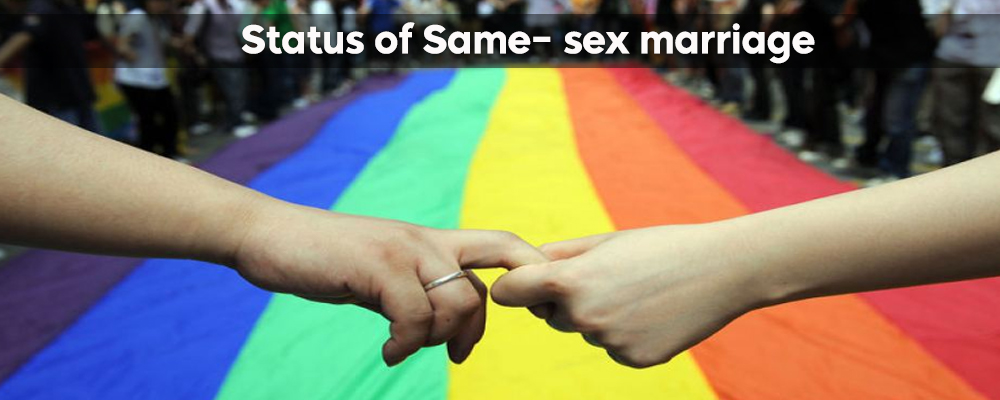Same-sex marriage is not yet legal in India. However, significant progress has been made in recent years to achieve this goal. One such development is the ongoing case in the Supreme Court of India regarding same-sex marriage. The case was filed by Navtej Johar and Sunil Mehra, two women challenging Section 377 of the Indian Penal Code, which criminalizes homosexual acts. In September 2018, a five-judge bench of the Supreme Court criminalized homosexual acts, effectively scrapping Section 377.
After this important decision, many members of the LGBTQ+ community and their allies began to support the legalization of same-sex marriage in India. The current Supreme Court case is related to this issue, as several petitions have been filed to recognize same-sex marriage in the country. The petitioners argued that denying same-sex couples the right to marry violates their fundamental rights guaranteed by the Indian constitution. He also said that several other countries, including the United States, Canada and some European countries, have legalized same-sex marriage and India should follow suit.
Need A Legal Advice
The internet is not a lawyer and neither are you. Talk to a real lawyer about your legal issue

Opponents of same-sex marriage argue that it goes against traditional Indian values and beliefs. They also argue that marriage is a sacred institution between a man and a woman, and that legalizing same sex marriage would harm that institution. The Supreme Court is now hearing arguments from both sides and will decide the matter in due course. It remains to be seen how the court will rule, but many activists and supporters of the LGBTQ+ community hope that same-sex marriage will be recognized in India.
The same-sex marriage case in the Supreme Court of India is an important step towards achieving equal rights and recognition for the LGBTQ+ community. While there are still many hurdles to overcome, the ongoing legal battle is an important step towards a more inclusive and just society. It is important for all of us to support and stand with the LGBTQ+ community in their fight for equality and justice. Same-sex marriage has been a topic of debate and discussion around the world for years. Same-sex marriage is a controversial issue in India, with many people protesting and opposing it. The Supreme Court of India has heard several cases related to same-sex marriage, and in this blog we will look at these cases in chronological order.
1. Yayasan Naz v. Government of NCT Cirebon (2009)
The case is the first in India to file a Public Interest Litigation (PIL) by NGO Naz Foundation to criminalize homosexual acts among adults. The Delhi High Court ruled in favour of the applicant, ruling that Section 377 of the Indian Penal Code, which criminalizes homosexual acts, is unconstitutional. However, the decision was challenged in the Supreme Court in 2013, which reinstated Section 377.
2. Navtej Singh Johar v. Union of India (2018)
In this case, the group of petitioners once again challenged the constitutionality of Article 377. In a historic decision, the Supreme Court struck down Section 377 and criminalized homosexual acts between adults. The court held that the LGBT community has equal rights and protection under the law and that Section 377 violates their fundamental rights.
3. Arif Jafar v. State of Uttar Pradesh (2019)
In this case, the Supreme Court directed the government to provide compensation to Arif Jafar, a gay rights activist who was arrested and detained for over a month under Section 377. The court also ordered the government to take steps to prevent such arrests in the future and to sensitize police officials to LGBT issues.
4. Anwesh Pokkuluri v. Union of India (2020)
In this case, a gay rights activist filed a petition seeking recognition of same-sex marriages under the Hindu Marriage Act, the Special Marriage Act, and the Foreign Marriage Act. The Supreme Court refused to entertain the petition, stating that the issue of same-sex marriage was a matter of legislative policy and that it was for Parliament to decide.
5. K. S. Puttaswamy v. Union of India (2021)
In this case, the Supreme Court was called upon to decide the constitutionality of the Transgender Persons (Protection of Rights) Act, 2019. The court upheld the constitutionality of the Act, but also issued several directions to the government to ensure the protection of the rights of transgender persons.
Homosexuality in India was legalized in 2018 by the Supreme Court. However, same-sex marriage is not legally recognized in the country. Here are some perspectives from various organizations on this issue:
- LGBTQ+ Legal Organizations: LGBTQ+ legal organizations such as the Naz Foundation and the Humsafar Trust are working to legalize same-sex marriage in India. They argue that denying same-sex couples the right to marry violates their fundamental rights and leads to discrimination.
- Religious organizations: Religious organizations in India, including the Hindu, Muslim, Christian and Sikh communities, oppose same-sex marriage. They argue that marriage is a sacred institution between a man and a woman.
- Political parties: Political parties in India have different positions on same-sex marriage. Some parties, such as the Hindu Party and the Aam Aadmi Party, support the legalization of same-sex marriage. Others like Bharatiya Janata Party and Rashtriya Swayamsevak Sangh opposed it.
- Business organizations: Business organizations in India do not take a clear stand on same-sex marriage. However, some companies like Godrej and Tata Steel support LGBTQ+ rights and implement inclusive policies for their employees. Lead India Law Associates provides legal assistance for various legal matters through experienced lawyers and legal experts. We provide legal advice, draft and review legal documents, represent clients in courts and tribunals, and provide other legal services to help clients solve their legal problems effectively and efficiently.




 Talk to a Lawyer
Talk to a Lawyer